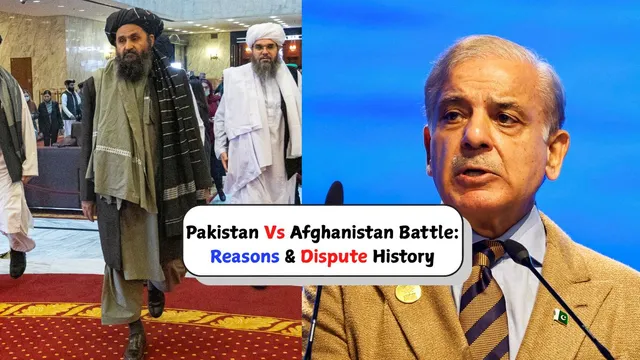- By Aditi Priya Singh
- Thu, 16 Oct 2025 05:54 PM (IST)
- Source:JND
The 2,600-kilometre border between Afghanistan and Pakistan has long been a source of hostility and tension. This region, known as the Durand line, was drawn in 1893 during British colonial rule, but Afghanistan has never formally recognised this area. Recently, on Saturday, 11 October 2025, both countries’ troops started deadly firing on multiple locations on the Durand Line.
Afghanistan Taliban forces launched attacks on Pakistani troops, calling it “retaliation for air strikes carried out by Pakistani forces on Kabul.” Zabihullah Mujahid, a Taliban spokesman, reported that 58 Pakistani soldiers were killed and 30 were injured in clashes, while nine Taliban fighters were killed. Pakistan, however, provided varying figures, asserting that 23 Pakistani soldiers and more than 200 Taliban fighters were slain during the fighting.
Shehbaz Sharif, the prime minister of Pakistan, praised the troops and denounced the Taliban's violence. The "situation is under control," according to Afghan Foreign Minister Amir Khan Muttaqi, who was on a visit to India, on Sunday. "We met the goals of our operation last night. After that, our friends from Saudi Arabia and Qatar made a plea for the war to end immediately, and it has now done so," he said.
Recommended For You
Historical Background: The Durand Line
*Creation of the Durand Line: The Durand Line, which defined their respective spheres of influence, was agreed upon by British India and the Emirate of Afghanistan in 1893. This agreement was never meant to be a permanent international border; rather, its goal was to stabilise the area.
* Afghanistan's Stance: Long-standing land disputes result from Afghanistan's failure to formally recognise the Durand Line as its border with Pakistan.
* Ethnic Implications: Communities on both sides of the Pashtun ethnic group struggle with identity and self-determination as a result of the line.
ALSO READ: Drone Footage Shows Taliban Dropping Bomb On Pakistani Military Post | VIDEO
Ethnic and Political Dimensions
Pashtun Nationalism
The Pashtun community, which is located in both Pakistan and Afghanistan, has long pushed for more recognition and autonomy. Issues like enforced disappearances and military operations that impact their communities have been brought to light by movements like the Ashtun Tahafuz Movement (PTM).
Impact of the Taliban's Return
Relations with Pakistan have become more complex as a result of the Taliban's comeback in Afghanistan. Although Pakistan initially backed the Taliban, questions have been raised about the Taliban's unwillingness or incapacity to regulate militant organisations that operate from Afghan territory.
Geopolitical and Security Concerns
Militant Activities: Security issues have been made worse by the TTP and other militant organisations using Afghan territory as a base from which to attack Pakistan.
Pakistan's Security Strategy: Pakistan has urged the Afghan Taliban to act against these organisations because it sees their existence as a direct threat to its national security.
International Reactions: The growing violence has alarmed the international community, which has called for both sides to engage in dialogue and exercise restraint.
Civilian Casualties: According to reports, airstrikes and cross-border shelling have killed and injured numerous civilians on both sides of the border conflicts.
Displacement: The ongoing conflict has forced thousands of families to flee to safer regions of their respective nations.
Infrastructure Damage: Trade and humanitarian help have been hampered by the destruction or damage to important border crossings and infrastructure.
ALSO READ: Pakistan, Afghanistan Agree To 48-Hour Ceasefire After Airstrikes Kill Civilians Along Border
The border dispute between Afghanistan and Pakistan is a complicated matter with political, ethnic, and historical roots. Tensions are still heightened by the Durand Line's unresolved status, and the region is already more unstable due to the return of militant organisations. Addressing these fundamental problems via communication, respect for one another's sovereignty, and collaboration in the fight against terrorism will be necessary for efforts toward peace and stability. Achieving a long-term solution will depend heavily on the international community's ability to facilitate these talks.



-1764766368292_m.webp)
-1764754812719_m.webp)

